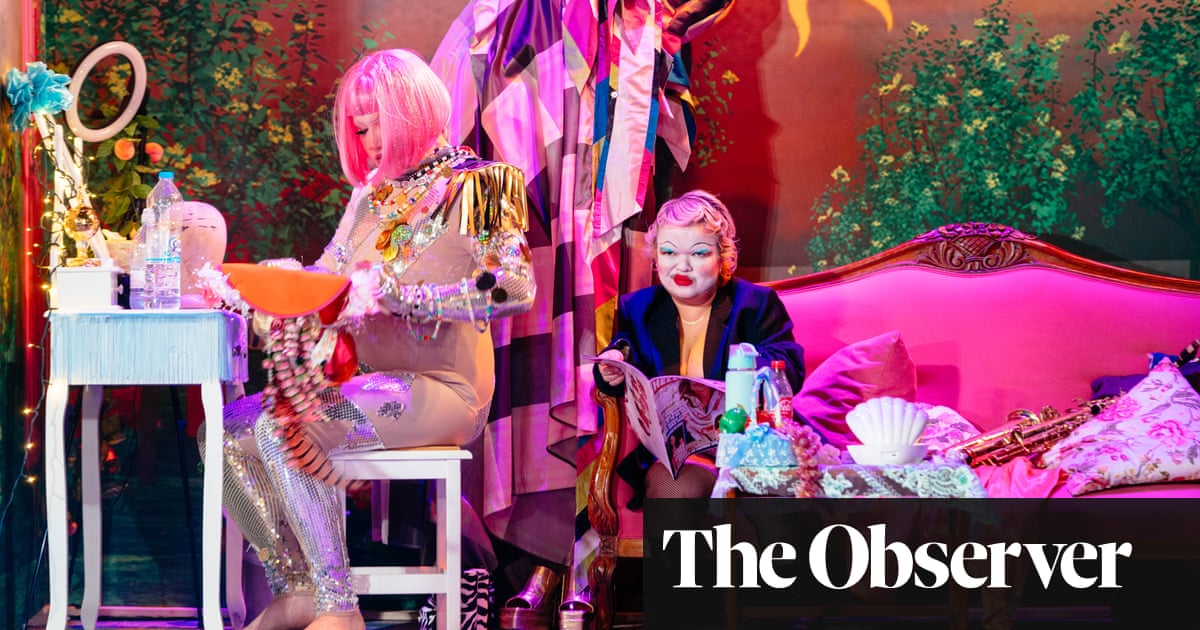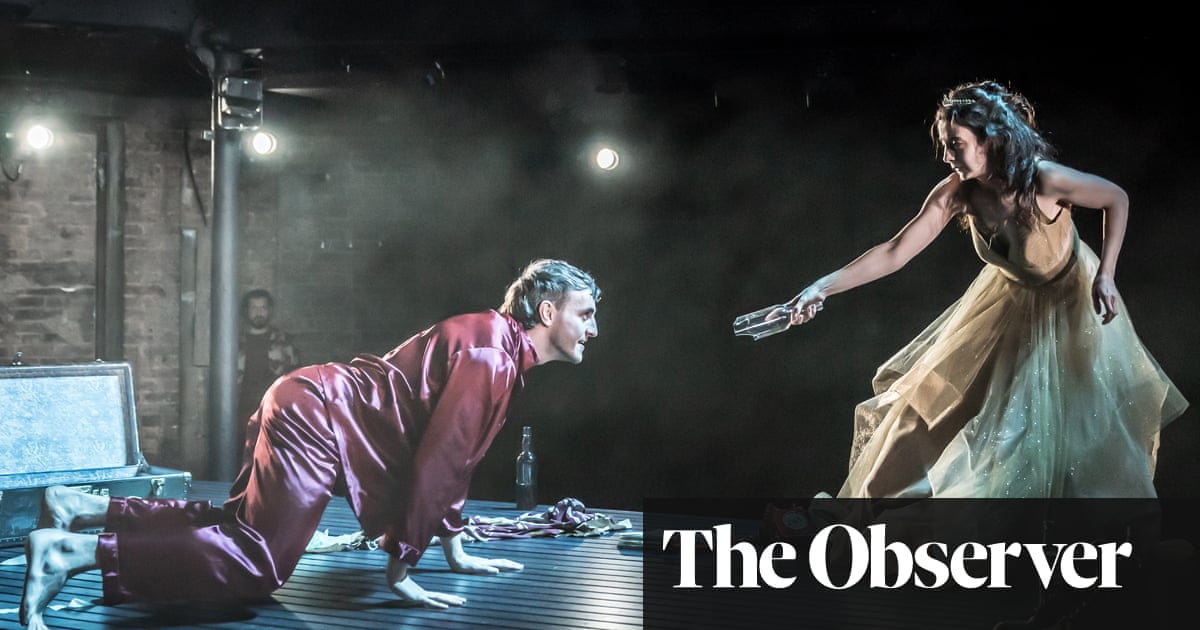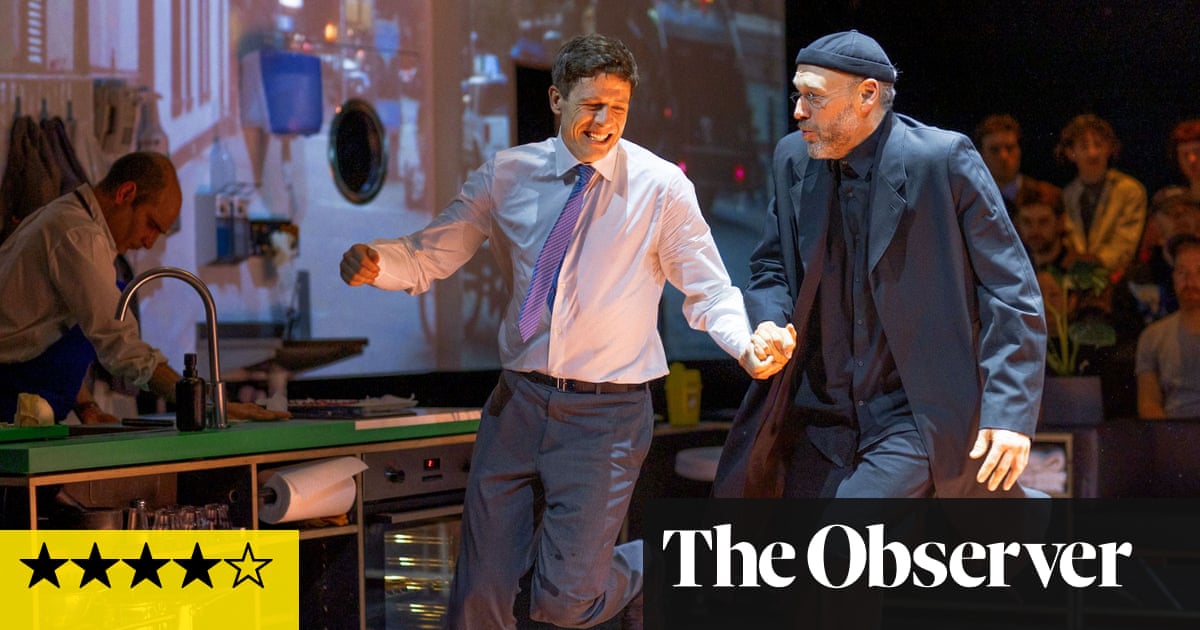
Trafalgar Studios; Royal Court, London; Theatre Royal Brighton
Sebastian Barry’s tale of two cellmates succeeds despite plausibility issues, while Katherine Parkinson is magnetic in a flimsy play involving a lost shoe
Susannah Clapp
Susannah Clapp
@susannahclapp
Sun 15 Mar 2020 10.30 GMT
Shares
1
Comments
1
Niall Buggy and David Ganly in Fishambles On Blueberry Hill. Photos by Patrick Redmond
‘An electric awareness’: Niall Buggy, left, and David Ganly in On Blueberry Hill. Photograph: Patrick Redmond
Sebastian Barry’s new play – his first in nearly a decade – has a major (and undisclosable) twist. It is a twist that is also a dare. The circumstances are improbable, the conclusion risks staining the action with sentimentality. To work, On Blueberry Hill needs a leap of faith from the audience. I leapt.
Two men in prison uniforms, perched or sprawling on bunk beds, deliver monologues. In Sabine Dargent’s set, bright pages – the colour of the Gaelic Bible – dangle from the ceiling: the bunk beds are in a kind of limbo. Niall Buggy is canny and comic as the man who has said yes to everything from crane-driving (when he didn’t know how) to women (when he had more than enough already). David Ganly is reflective as a former seminarian shaken by his love for another man, slowly coming to terms with the deed that has imprisoned him. They tell their stories separately. At first they meander through luscious recollections of childhood and mothers, and falling in love. Then comes acknowledgement from both that they have committed murder: one of them, in a singularly chilling admission, says he acted on what felt like a whim.
Their stories converge. That strains credibility, but still more so does the movement in a short play from terrible violence to behaving like turtle doves. How does Barry pull it off? By giving us a new vocabulary in which to think about his characters. As they reminisce, they accidentally describe themselves and their circumstances. They are “harsh but radiant”: like the woman, both adored and betrayed, who is “shining with beauty” and has an accent “that would mash spuds”.
Jim Culleton’s rapt production for Fishamble, which has already been seen in Ireland (including Dublin’s Mountjoy prison) and New York, wonderfully captures the idea of bullseye moments, of episodes of an electric awareness – the cell “vibrates” with the energy of the two men – but also a stately mythology, the bringing of shades to life.
Katherine Parkinson: ‘Felicity Kendal’s wellies are big ones to fill’
Read more
EV Crowe has come up with a terrific title. Shoe Lady casts a shrewd glance at the way almost any noun slung in front of the word “lady” becomes an insult: think “bag”, think “cat” – and compare “bat man”. She has also brought serious legwork and fancy footwork to the subject of one woman’s unravelling. Shoes – on your uppers, well-heeled – are one of the quickest guides to status. And they carry a fairytale history of horror. I might like to think I’d have been Cinderella but, lacking dainty feet, I’d more likely be one of the Ugly Sisters, hacking off part of her heel to get it into the glass slipper. Crowe hints at all this in her story of an estate agent who loses a shoe and with it her equilibrium: she has for a time more in common with a street-dwelling cider drinker (also down to one shoe – a flattie) than with her boss, whose high heels are glimpsed under a lavatory door. She hobbles, her foot bleeds, she is “short of normal”.
Katherine Parkinson in Shoe Lady.
Facebook Twitter Pinterest
‘Losing a shoe and her equilibrium’: Katherine Parkinson in Shoe Lady. Photograph: Manuel Harlan
Katherine Parkinson, for the most part alone on stage, is magnetic. Struggling not to be wild, she projects an almost fluorescent aureole of alarm. Sinking into darkness, she is often surrounded by hyper-brightness in Chloe Lamford’s set and with Natasha Chivers’s lighting. Director Vicky Featherstone keenly enhances the eeriness – and towards the end stages a musical number in the form of a wonderful trudging chant.
Advertisement
There is plenty to intrigue but not enough to satisfy. The politics are insubstantial. Crowe has interestingly cited Arnold Wesker as an influence, alongside Caryl Churchill. A touch of Wesker-style documentary might have bolstered the episode with the rough sleeper. Disturbance sometimes fades into ditziness. And the account of the actual losing of the shoe is not detailed enough to convince a Londoner continually puzzled by seeing abandoned footwear everywhere.
Buzzing with talent, raggedy in structure, Crongton Knights is the second in a series of plays co-produced by Pilot Theatre and theatres in Coventry, Derby and York with the aim of staging mid-scale productions for young people. Last year they created a fresh version of Noughts & Crosses; now Emteaz Hussain has adapted Alex Wheatle’s novel about a group of teens binding together as they set out on a quest. The holy grail is a mobile phone; the “damsel” in distress (she uses the word about herself) needs it back urgently from her bullying ex-boyfriend because he used it to store sex pictures of her.
A number of contemporary difficulties are corralled on to the stage: one girl has escaped from Syria assuming but not knowing her father is dead; another is haunted by the shooting of her young cousin. The script interrupts the action every now and then to thump home various decent points about friendship, getting grief counselling, not carrying guns and knives. Trim some of this spelling-out and there is a fine, stirring event.
Crongton Knights
Facebook Twitter Pinterest
‘Buzzing with talent’: the cast of Crongton Knights. Photograph: Robert Day
Simon Kenny has created a spot-on bunker-like set with swarming graffiti. Crucially, Conrad Murray, founder of Battersea Arts Centre’s brilliant Beatbox Academy, has composed a score that surges through the evening – with ballads as well as beatboxing. The cast pull together strongly, particularly in an imaginative cooking number, where they might be part of a giant food mixer. From the beginning Aimee Powell stands out for the sinuousness of her movement and her knockout voice, which is put to beautifully apt use: she sings of the need for independence without accompaniment, as if she is truly standing alone. Another remarkable voice is heard a little later: Kate Donnachie, less soulful, more troubled, snags at the heart – and goes to the heart of the project, pleading for acceptance by her peers and for complete individuality.
Star ratings (out of five)
On Blueberry Hill ★★★★
Shoe Lady ★★★
Crongton Knights ★★★
• On Blueberry Hill is at the Trafalgar Studios, London, until 2 May
• Shoe Lady is at the Royal Court, London until 21 March
• Crongton Knights tours until 9 May
Topics












